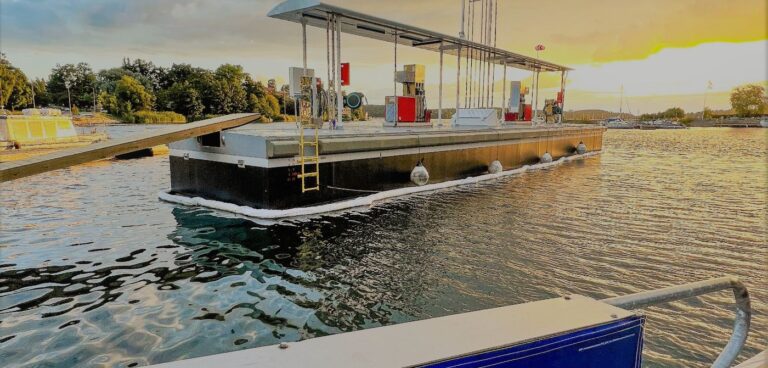Swedish company Fossil Free Marine has announced that an unmanned mobile marine station, developed by Fossil Free Marine and built by Swede Ship Composite in Hunnebostrand, will be established in Lidingö just outside of Stockholm, and operated by Swedish fuel company OKQ8.
The new unmanned mobile fuel station is, the company states, a world’s first – patent-pending, design protected, assured by the DNV and compliant with the same strict environmental and safety standards as a modern unmanned station on land. It bridges the distribution gap from suppliers of sustainable fuels to boat owners wishing to reduce their environmental impact. For the first time, boaters can now conveniently access modern drop-in renewable fuels, that can be run in any diesel or gas engine, resulting in immediate and substantial reductions in CO2 emissions (up to 90% reduction of CO2e with, for example, HVO100).
“This is obviously a massive milestone for Fossil Free Marine, as we can now show both the fuel industry as well as the marine industry what we have been working on for many years,” said Karl-Oskar Tjernström, co-founder and CEO of Fossil Free Marine. “But for us, it’s a stepping stone, as we plan to change the way fuels are distributed in the marine sector, and take part in making boating sustainable, on a global scale. We’re happy to have found a partner like OKQ8, that shares our vision of what needs to be done to make pleasure boating sustainable. Our technology is truly groundbreaking, enabling distribution of renewable fuels in large volumes, even in the most sensitive marine environments like freshwater reservoirs.”
The first unit was delivered to site, in Islinge (Lidingö) on July 21, for installation and commencement of operations in the following week. At Islinge, the new unmanned marine station lies directly adjacent to OKQ8’s existing marine station, enabling pleasure boats and commercial traffic to make the needed shift to renewable fuels, with a modern turn-key solution that is both economically viable, safe and environmentally friendly.
Construction is futureproofed from an environmental and safety perspective, and well protected from fuel theft, with all piping securely below deck, beneath a single locked access hatch.
The station will enable an increase in the number of fuel qualities, enabling the operator to closely follow changes in consumer demand – for example, offering smaller volumes of more niche fuels, such as specific biofuels, while maintaining financially viable operations. It also complies with stringent environmental safety regulations, such as those for freshwater reservoirs, and provides futureproofing for coming regulations for other sensitive marine environments.
Increased volume capacity enables more profitable operations, due to improved logistics and lower risk of out-of-stock. The design ensures the station stays level even with varying tank volumes and tanks are compatible with all types of liquid fuels, including more corrosive modern biofuels.



